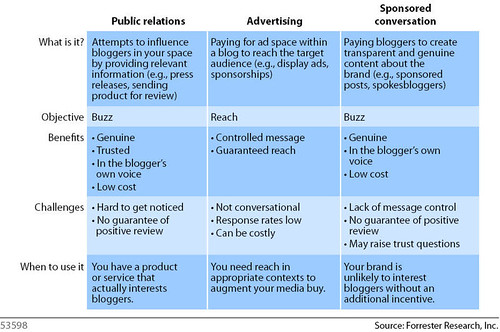Sponsored Conversations: When it’s ok to pay bloggers to post
The subject of pay-for-post blogging has created a lot of heated discussion in the blogosphere. It was especially heated a few months ago when Kmart worked with pay-for-post vendor IZEA to give several prominent bloggers free shopping sprees in exchange for sponsored posts about their stores. Today we published a document titled “Add Sponsored Conversations To Your Toolbox” in which we advise marketers to pay bloggers to post under very specific conditions, a practice we call “sponsored conversation.” The two most important conditions that marketers must follow when using sponsored conversation are 1) sponsorship transparency and 2) blogger authenticity. Sponsorship transparency means that both the marketer and the blogger must make it absolutely clear to the reader community that they are reading paid content – think of Google Adwords “Sponsored Links.” Blogger authenticity means that the blogger should have complete freedom to write in their own voice – even if the content they write about the brand is negative.
This practice makes the most sense for marketers with low awareness and/or little buzz but do have confidence in their brand. A company like Apple doesn’t need to do this as there is plenty of awareness and buzz. Yet consider a brand that sells products like batteries or mufflers – products that may not get a lot of discussion on blogs but may be quality products. For these low buzz brands sponsored conversation is another way to increase discussion about your products. Take the Kmart example, according to Vitrue, a company that tracks buzz through a metric call SMI (social media index); Kmart’s buzz increased 59% in December alone – a key time for a retailer battling giants like Wal-Mart and Target. And according to IZEA, through December 5th the Kmart campaign had generated more than 2,000 related comments across the six participating blogs, more than 2,500 contest entries via tweets, and collective reach across the blogs, Twitter etc. to approximately 500,000 people (see more at MediaPost).
While backlash against these types of programs can certainly affect marketers (especially when done wrong like “Wal-Marting across America” with its lack of authenticity), it can have a much bigger impact on the blogger. It is the blogger who has built the relationship with his or her community and it will be the blogger’s credibility on the line. Sponsored conversation then becomes a question of self-identity for blogs. It makes sense for bloggers who rate or discuss products but makes zero sense for bloggers that consider themselves journalists. Yet many bloggers want to get paid for their time and this practice isn’t really that new, it just needs to be done the right way. As long as the conditions of transparency and authenticity are met then sponsored conversation can be a powerful tool for marketers, right alongside their advertising and public relations efforts.
